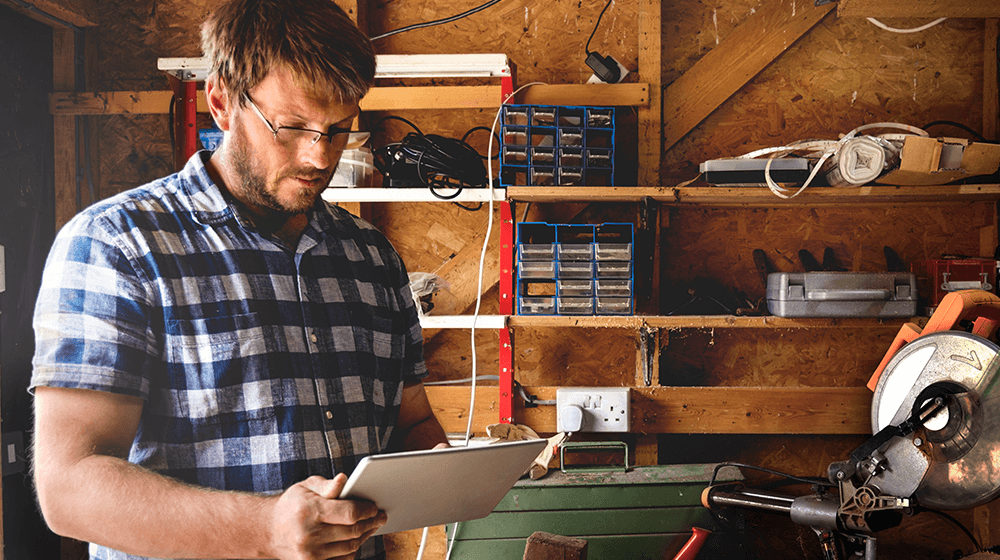[ad_1]
If you buy something through our links, we may earn money from our affiliate partners. Learn more.
Owning and opening a liquor store can be an attractive and highly profitable business venture. As of January 2021, the industry’s robustness was on full display as the sales for liquor, beer, and wine in America reached an impressive figure of $5.32 billion.
In the following sections, we present a complete guide on how to successfully navigate the process of opening a liquor store.
This detailed post will encompass all the essential steps, from articulating why this type of business might be a savvy choice, to dissecting the costs involved and demystifying the regulations.
This is your one-stop guide to all things liquor store start-up.
Why You Should Open a Liquor Store Business
A liquor store business does not necessarily have to exist in isolation; it is not always a standalone entity.
As a form of retail business, it offers substantial flexibility. It’s worth considering the various models that this business can take, as evidenced by the different names they are known by, including bottle shop, package store, and wine shop.
A liquor store can seamlessly merge with other ventures, even functioning as part of a grocery store, thereby enhancing its potential profitability and appeal to a broader consumer base.
Here’s some other reasons to open up a business like this:
- They’re recession proof. Even when the economy dips, the demand for liquor spikes.
- The inventory has a long shelf life. Some wines need to be stored in dark places. But most of the inventory in a liquor store is stable.
- The demand isn’t seasonal. Liquor goes well with any event at any time of the year.
- You can stock competing brands. You can be an outlet for Jameson, Johnny Walker or Jack Daniels. Best of all, they all look after their own marketing.
Of course as a liquor store owner, you get to be your own boss.
How Much Does it Cost to Open a Liquor Store?
If you’re considering starting a liquor store, you should be prepared to make an initial investment that will likely fall between $50,000 to $100,000 at the very minimum.
This cost will cover a range of requirements essential to getting your store up and running. Items like stocking up a diverse inventory, purchasing necessary equipment, hiring adequate staffing, and fulfilling legal requirements all constitute this initial financial outlay.
Here’s a breakdown of a few of the items.
- The money liquor store owners need to stock shelves can add up to $35,000. You’ll need a good selection of beer, wine and liquors.
- Renovations like new racking and shelves can run up to $20,000. These can be an expensive purchase.
- Insurance like Worker’s compensation and liability can set you back $2,400 in premiums.
There are other costs to opening a liquor store. But these give you a place to get started.
Starting a Liquor Store Business: 19 Important Steps
The journey to owning a liquor store begins with a simple idea. Transforming this idea into a fully functioning, profitable business poses its share of challenges.
To help you navigate this journey, we have compiled 19 key steps that will guide you through the entire process of establishing your own liquor store.
1. Research the Liquor Store Industry and Know it Well
Having a thorough understanding of the business landscape is pivotal to your success. This requires detailed research aimed at gathering valuable data about potential customers and industry trends.
This data will be instrumental in formulating a robust business strategy.
Luckily, solid research doesn’t need to break the bank.
- Google Trends is a good tool. You can enter search terms to find out what’s going on in your area or nationally.
- Check the list here of some other excellent market and industry research tools.
Other places to look for info include industry trade associations and local industrial development boards.
2. Create a Business Plan
If you Google the right keywords, you can find a business plan template online for a liquor store. But you’ll still need to make sure it’s professional and complete.
Here’s a few things to keep in mind.
- Stressing the combination between demographics and location will help to convince lenders. Highlight how the ownership and day to day management work when outlining the business model.
- The marketing plan for liquor stores are critical. Facebook and Google do not allow marketing for liquor. However, a new business can use directories and other online places like Yelp.
- The business plan needs to have financial projections. These should involve cash flows and a projected balance sheet.
3. Know Your Target Market
Store owners need to know who their customers are. You need to know who your target market is when you are opening a liquor store. Here are a few boxes store owners need to check.
- Understanding the benefits your business provides helps to define who you need to focus on. Find who will benefit the most from your liquor store. Consider the demographics like gender and income level. Who is most likely to make a purchase?
- Location is important. The chances are your liquor sales will only be relevant to one area. Find your customers using geographic characteristics. This makes for personal customer service.
- Take a look at the competition. The customers they have could be the ones you want. Getting information about your rivals’ strategies can help.
Running test ads can also help you to define your target market. Check out Google Ads.
4. Think of a Business Name for Your Package Store
The power of branding cannot be underestimated, and it begins with a well-thought-out name for your liquor store. This name should ideally reflect the uniqueness of your inventory and services. Use these tips to get started:
Think About Your Inventory and Services
Think about what makes your inventory different than the competition. Maybe you’re focusing on spirits and wine or craft beers? One note of caution when you’re putting together this list. Watch out for any terms that might limit your liquor stores future growth. Like Beer-Barn.
Rhyming words are catchy. They make excellent business names. It’s best to stay away from acronyms and initials since these are hard to remember. You can use geographic terms to your advantage. Like states and regions, city nicknames and neighborhoods.
5. Choose the Perfect Location
A prime location can guarantee a steady flow of customers. Various factors to consider include accessibility, ample parking, foot traffic, street visibility, and potential for curbside pickup. A thorough assessment of these factors is necessary before investing in a particular location.
6 . Secure Funding for Your Wine Shop
To get your business off the ground, you will need financial backing. There are several funding options available, from bank loans to seeking investors, each with its pros and cons.
Here are other options.
- SBA Loans. These are guaranteed by the Small Business Administration. Get matched up with lenders here.
- Bootstrapping is another way to get the money to start your business. This is all about using your own money. The majority of startups either use savings or reinvest profits after they start.
- Small business grants come in different types. Look for federal, state or regional options.
Crowdfunding is another way to get the money you need for starting a liquor store. You can also go to accredited investors and raise money with SEC rules.
7. Form a Legal Entity
Registering startup liquor stores as business entities is an important step. You can choose from several different types including DBA, corporation or LLC.
- A limited liability company is flexible in the type of management structure it has. They also provide pass-through taxes. That means the business itself doesn’t pay.
- If you want your business to be publicly traded, a corporation is the right choice.
- Partnerships are more informal. There are several versions that can affect the tax debts of each partner.
A sole proprietorship is the way to go to avoid double taxation. However this type of business entity leaves the owner exposed for liability. Contact a lawyer who will walk you through the process.
8. Create a Business Bank Account
Getting a business bank account that comes with a business credit card is next. Requirements are different in each state but here’s some general information.
- You’ll need to open the account by visiting the bank in person. Bring along official photo ID and some bank statements as well as your home address.
- Your business needs to be registered in America. You might need to work with an attorney first to establish your US business entity.
- Liquor stores also need a physical location in the United States. Some businesses can use an attorney’s office or other registered agents.
Finally, you will also need an Employer Identification Number (EIN) to get one of these accounts. Investing in one of these tools is a great business idea.
9. Know Your Taxes
Liquor stores get taxed like other businesses.
- Your business will pay a state retail tax on alcohol sales.
- There might be additional alcohol tax through counties and cities.
Here’s a breakdown of the taxes you can expect to pay in different states.
10. Acquire a Liquor License and Permits
A liquor license gives your business the authority to serve alcohol. Each state has individual rules for licenses. Some even have quotas on available permits.
Each state has an Alcohol Beverage Control Board (ABC)overseeing distribution, sale and production. Different state definitions include some of the following:
- How much you can charge.
- The amount that you can serve to a customer.
- Who can be served.
- Who can serve alcohol and in what kind of containers.
- The times and places that you can serve alcohol.
The first step is contacting the right alcohol beverage control board.
11. Get Insurance
Owning this type of business can be profitable. But it comes with many risks to and that’s why you need liquor store insurance. Here’s a few types you will need.
| Type of Insurance | Purpose |
|---|---|
| Liability Insurance | Covers any accidents that occur involving customers at your store. |
| Liquor Liability Coverage | Helps to settle claims against someone who has consumed alcohol at your premises and subsequently caused harm or damage. |
| Workers Compensation | Covers loss of income and medical costs when employees are injured while on duty. |
| Data Protection | Provides coverage for claims when your business data is stolen or breached. |
| Umbrella Liability Insurance | Covers additional expenses not handled by a general liability policy. It’s recommended to check your state’s regulations for this. |
Remember, owning a liquor store can be profitable but comes with several risks. To mitigate these, investing in comprehensive insurance coverage, including the types listed above, is strongly recommended.
12. Design Your Brand
Your liquor business needs to have a good brand. Logos that are to the point and simple work best. Dont forget to implement the ‘all rights reserved’ copyright. Make sure the design works on mobile websites and online ads. Use layouts and fonts that can adapt to print and stay consistent.
Don’t be afraid to change things up as your business goes along. Some recommendations say you should rebrand every five years.
13. Set Your Prices
Pricing your products requires careful consideration. Approaches such as the ‘pour size’ method and classifying your inventory into different price tiers can help balance customer satisfaction and profitability.
Pour Size
One of the common ways to price drinks is to use what is called the pour size. It’s simple. Just take the price it costs to make the drink. Then divide it by what you think you should sell it for. If those numbers don’t work, you can adjust the pour size. This is a good way to set a retail sale.
Four Classes
You can also divide the liquor up into four classes. Cheap house liquors should have the lowest price. Next up are the ones customers call by name like Bacardi.
Premium is the name given to a certain brands of the highest quality. The most expensive are super premium liquors like Johnny Walker.
14. Plan your Marketing
A well-thought-out marketing plan can give you a competitive edge.
- A good website is essential. Make sure that it is mobile friendly. That means using product pictures and text that look good on smartphones and laptops.
- Use social media for marketing but be selective. A Facebook Page allows you to target your audience and it costs nothing to get started.
Your business can also collaborate with local distributors. Don’t forget to get your name in business directories too.
15. Stock Your Inventory
Being able to stock your inventory and stay on top of it is important. A POS system can tackle many jobs when it comes to liquor store inventory management.
These can help you run this type of business through a central hub. You can manage and track your inventory in real time. Generate sales reports so you’ll know which liquors to stock. These systems even track sales in real time.
A good POS system can also track your case counts as you bring stock in. You can get started with a liquor inventory spreadsheet like this one.
16. Hire a Team
Great customer service is important for these businesses. Your team will need to include cashiers, clerks managers and supervisors. That’s a general overview and you might be able to do with less employees.
Keep in mind there will be additional expenses. Like Workmen’s Compensation insurance, healthcare contributions and any paid time off.
17. Create Multiple Income Streams for Your Wine Store
There are many different things you can do to create multiple income streams. You can rival convenience stores by offering snacks and becoming a lottery retailer.
- You can also offer swag and other promotional items.
- A delivery service is another way that your liquor stores can make a little extra money.
- Increase your profit margins by stressing the points available through purchases made with credit cards.
18. Hold a Grand Opening
A grand opening represents the culmination of your hard work, marking your liquor store’s official entrance into the marketplace. It’s not simply about unlocking the doors but crafting an event that creates an engaging first impression.
Develop an effective advertising plan that may include various strategies such as targeted social media campaigns, print media advertisements, and radio or television spots. Consider using flyers and local newspapers to reach out to your immediate community.
Allocate a budget for the event, accounting for promotional materials, refreshments, and possibly live entertainment to draw in crowds.
Carefully choose the date and time, making sure it aligns with your target demographic’s availability and doesn’t conflict with other significant local events or big-box store sales. Invite friends, family, and influential community members to generate buzz around your store’s debut.
19. Be a Successful Liquor Store Business Owner
Upon successfully opening your store, the journey to becoming a prosperous liquor store business owner truly begins. It’s a continuous process, demanding persistent effort and strategic innovation.
- Prioritize regular employee training to augment your store’s revenue and elevate the customer experience.
- Regularly monitor the efficacy of your marketing strategies and adjust as needed based on performance data.
- Utilize web analytics to track online campaign effectiveness and leverage this data to make informed decisions.
- A well-functioning POS system is invaluable, allowing you to stay ahead by accurately managing inventory, tracking sales trends, and even forecasting future demands.
- Remember, maintaining the success of your liquor store requires ongoing diligence and adaptability in your operations and strategies.
Things Business Owners Should Think About Before You Start A Liquor Store
Before launching a liquor store, you should be aware of the complexities and challenges you may face. Such a venture is sizable, requiring substantial financial resources and legal compliances. To ensure your readiness, consider the following elements:
Costs of Owning a Liquor Store
As an aspiring liquor store owner, it’s crucial to understand the financial implications, which include not only initial capital but also ongoing costs. Legal and regulatory requirements are critical, and neglecting these can lead to significant penalties. Therefore, a comprehensive budgeting plan, including these expenses, should be developed.
- local compliance certificates, liquor licenses and permits are what you’ll need to sort out as a startup. Licensing fees can add up.
- You’ll also need insurance and an excellent POS system. Don’t forget it needs to take credit cards and other payment types.
- A steady supply on the shelves is important too. These inventory costs can shift so you’ll need a good relationship with your distributor.
- You’ll need a physical location in a specific state. And capital whether you want to lease,purchase or build. Make sure there’s adequate space and the right zoning.
Dont forget to establish your store as a legal entity. A business attorney is needed to get this part done.
Changing Laws
Alcohol-related laws frequently undergo modifications and also vary widely from state to state. Familiarize yourself with the regulations in your region using trusted references.
The most important law that governs all policies related to alcohol is the 21st amendment to the Constitution, which gives states the power to control the sale and distribution of alcohol.
Your Specialty
Differentiation can be key in this industry. Perhaps your store will emphasize a particular niche or category. Several specialty liquor stores have found success by concentrating on distinct areas, so it might be worthwhile to consider this approach.
- Wine shops cater to a specific high-end clientele. They offer a variety of domestic and international wines and have events like tastings. They can be categorized under wine stores.
- Others combine spirits as well as beer and wine.Their inventory is larger and might even have cigars and cigarettes. The classification here is liquor stores.
- Beer stores is another specialty. Here’s a list of the top American beer stores.
There’s often a lot of crossover in the kind of alcohol you sell.
Alcohol Sales Age Regulations
Although 21 is the legal age for alcohol consumption in most states, there are exceptions. In certain situations, such as serving alcohol in dining establishments, the age limit may drop to 18.
Other unique circumstances, like religious ceremonies, may permit minors to consume alcohol in over half the states.
Serving alcohol to a minor at your establishment is illegal. In some states, like Florida, you could be held liable for any ensuing damages or injuries. The person holding the liquor license may also face additional penalties.
How do I start a small liquor store?
Starting a liquor store, while rewarding, poses its own unique challenges. Begin by performing thorough industry research, understanding your potential customer base, and developing a robust business plan.
Inventory management, staffing, and marketing strategies all need to be devised, and all legal and licensing requirements should be met.
Consistent effort is required to maintain and grow any business, regardless of its size.
How much does it cost to stock a liquor store?
The inventory cost for a liquor store depends greatly on the variety of products you choose to stock. For a smaller store focused on beer, the cost may only be a few thousand dollars.
However, if your store leans toward high-end wines, a single case could cost upwards of a thousand dollars. If you plan on stocking a comprehensive liquor store, the total cost might climb to around $300,000.
What is the profit margin in a liquor store?
The profit margin here varies between 200 to 400%.
How do liquor stores increase sales?
There are several ways your store can increase sales, profits and cash flow.
- Offer discounts for buying more than one product. This will help your cash flow.
- Place impulse items in strategic locations.
- Put loyalty programs in place.
- Bundle products that make great gifts.
- Put together advertising opportunities with your distributors and vendors.
Coupons are another excellent way to increase your sales.
How much does a liquor store owner make a year in the USA?
Annual earnings for liquor store owners can vary significantly based on numerous factors. A store in a less favorable location or state might generate up to $70,000 per year.
Meanwhile, other stores can earn between $100,000 to $150,000 on average.
Nevertheless, most owners typically make between $20,000 and $50,000 per annum.
Save money on shipping costs for your Amazon purchases. Plus, enjoy thousands of titles from Amazons video library with an Amazon Prime membership. Learn more and sign up for a free trial today.
Image: Depositphotos
More in: How to Start
[ad_2]
Source link











